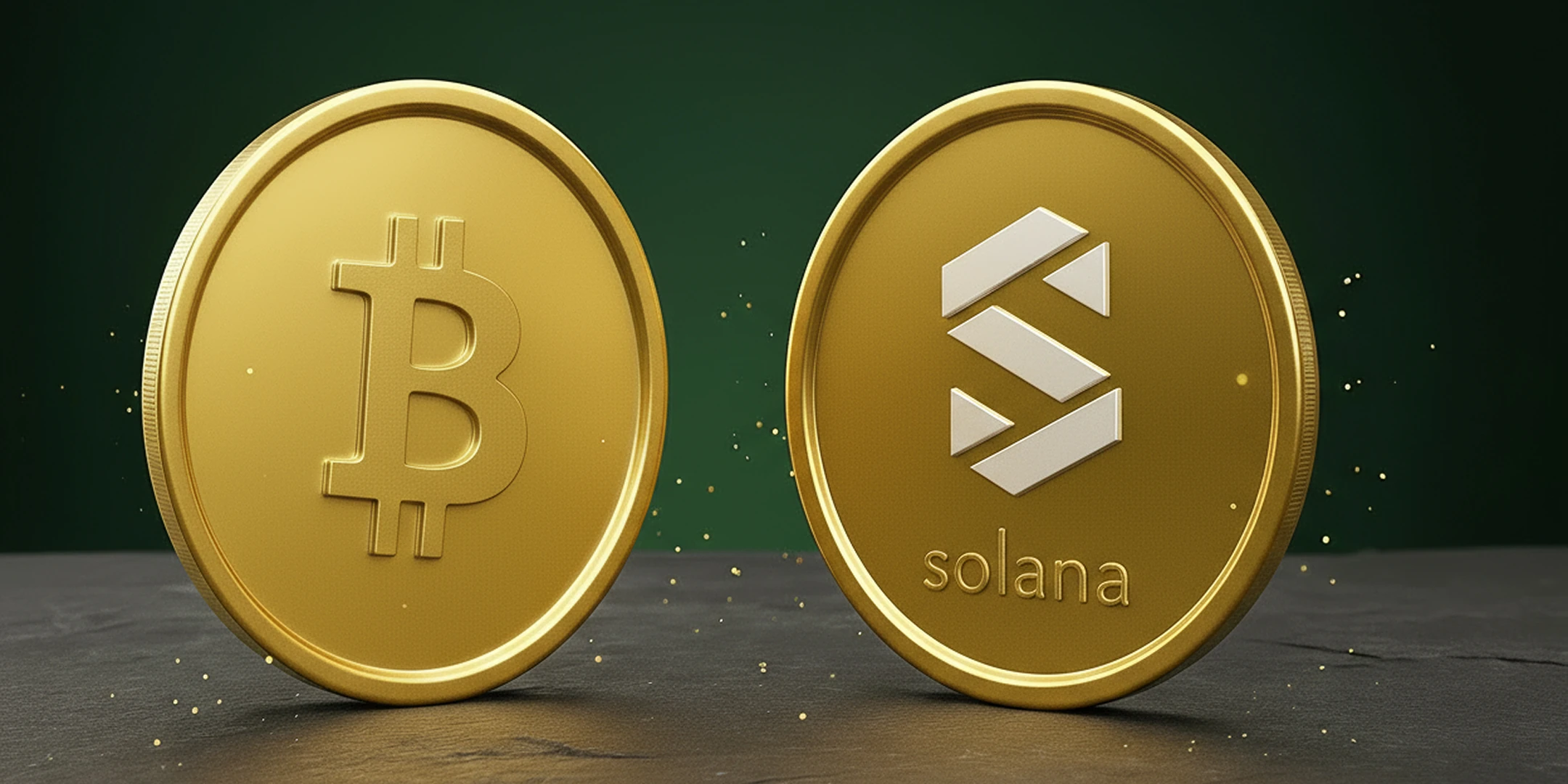In the world of cryptocurrencies, Bitcoin and Solana are attracting a lot of attention. While Bitcoin has been considered a pioneer of digital currencies for over a decade, Solana has made headlines in recent years due to its high transaction speed and scalability. Many investors are therefore asking themselves: Is Solana or Bitcoin better? What are the opportunities and risks of the two digital assets, and which cryptocurrency is suitable as a store of value in the long term?
This article provides an in-depth overview of Bitcoin and Solana, explaining their differences, consensus algorithms, transaction speed, and decentralization. In the end, it becomes clear why Bitcoin is the better choice for investors who value security, stability, and long-term value.
What is Bitcoin?
Bitcoin (BTC) was created in 2009 by the anonymous person or group “Satoshi Nakamoto.” It is the first cryptocurrency based on a blockchain — a decentralized, immutable register that documents transactions securely and transparently.
Consensus Algorithm
Bitcoin uses the proof-of-work (PoW) mechanism. Miners solve complex math problems to validate new blocks. This process ensures that transactions are verified and ensures security. The downside: High energy consumption, but this mechanism also makes Bitcoin extremely resistant to manipulation.
Decentralization and security
Bitcoin is characterized by strong decentralization. The network runs on thousands of computers worldwide, without a central control authority. As a result, Bitcoin is extremely resistant to failures, hacker attacks or political intervention — a decisive advantage over many newer cryptocurrencies.
Bitcoin as a store of value
Bitcoin is often referred to as digital gold because there is a limited amount of 21 million coins. This scarcity, combined with increasing acceptance among institutional investors, makes BTC a stable store of value. While the price can be volatile, many investors see Bitcoin as a long-term hedge against inflation and economic uncertainty.
Transaction speed and fees
The average transaction speed for Bitcoin is 3-7 transactions per second (TPS). Compared to newer blockchains like Solana, this is relatively slow, and transaction fees can rise when network usage is high. Despite these limitations, Bitcoin offers stability, security and a clear position as the first and best-known cryptocurrency.
What is Solana?
Solana (SOL) is a comparatively young cryptocurrency that came onto the market in 2020 and is known above all for its extremely high transaction speed and scalability. Unlike Bitcoin, which primarily serves as a store of value and digital gold, Solana aims to provide a platform for decentralized applications (DApps) and smart contracts that can serve large numbers of users simultaneously.
Consensus Algorithms
Solana uses a combination of Proof of Stake (PoS) and Proof of History (PoH). At PoS, validators are selected after their use (stake) to confirm new blocks. PoH, on the other hand, is an innovative timestamp system that makes it possible to insert transactions into the blockchain efficiently and in an orderly manner. This combination ensures that Solana can process several thousand transactions per second (TPS) — many times what Bitcoin does.
Smart contracts and applications
Solana supports smart contracts, similar to Ethereum. Developers can build DeFi applications, NFT marketplaces, gaming items, or other digital assets based on them. The platform features low transaction fees, which makes it particularly attractive for applications that require many small transactions.
Decentralization and risks
Despite the high speed, Solana is less decentralized than Bitcoin. A relatively small circle of validators controls a large portion of the network. This can lead to centralization risks and impair security and stability in the event of network issues. There have been several network outages in the past, which temporarily paralyzed the platform.
Scalability and speed
Solana's biggest strength lies in scalability. Thanks to POS/PoH, the platform can process thousands of transactions per second without a sharp increase in fees. For projects that rely on fast, cheap and large transaction volumes, Solana therefore offers clear advantages over older blockchains.
Synopsis
Solana is a fast, scalable blockchain that supports smart contracts and DApps and offers low transaction costs. However, this speed comes at the expense of decentralization and poses certain security risks. This makes Solana particularly suitable for developers and users who rely on performance and low costs, while Bitcoin continues to impress as a secure store of value and digital gold.
Solana vs. Bitcoin — Direct Comparison
When investors choose between Solana (SOL) and Bitcoin (BTC), several factors play a decisive role: consensus algorithms, transaction speed, decentralization, security, and long-term value.
Consensus Algorithms
Bitcoin uses Proof of Work (PoW), in which miners solve complex tasks to validate new blocks. This ensures maximum security and decentralization, but is energy-intensive and limits transaction speed.
Solana, on the other hand, uses Proof of Stake (PoS) combined with Proof of History (PoH). This enables extremely fast transactions and low fees, but reduces decentralization as a small group of validators controls a large part of the network.
Transaction speed and fees
A clear advantage of Solana is speed: The blockchain can process several thousand transactions per second (TPS), while Bitcoin only reaches 3—7 TPS on average. Solana's transaction fees are also significantly lower.
Solana is therefore more attractive for developers and users who carry out many transactions or use smart contracts. For Bitcoin investors, on the other hand, security, stability, and long-term value count more than maximum speed.
Decentralization and security
Bitcoin is considered a prime example of decentralization. The network is spread all over the world, and manipulation is almost impossible. Solana is faster but tends to be more centralized, which poses potential risks. Several network outages in the past show that Solana has not yet achieved the same stability as Bitcoin.
Store of value vs. useful token
Bitcoin is designed as digital gold: scarce, decentralized and a long-term store of value. Solana, on the other hand, is primarily a utility token for fast applications, DeFi projects, and NFTs. So anyone who wants to secure capital in the long term is in better hands with Bitcoin.
Market development and forecast
The price development (Solana vs. Bitcoin chart) shows that Solana can make huge price jumps in a short period of time, but at the same time is highly volatile. Bitcoin is growing more stably, with growing acceptance among institutional investors. For conservative investors and long-term strategies, Bitcoin is the better choice.
Investing in Bitcoin
Since its introduction in 2009, Bitcoin has established itself as a digital currency and store of value. For investors who rely on stability and security over the long term, Bitcoin offers several advantages over newer cryptocurrencies such as Solana.
Bitcoin as a store of value
Bitcoin is often referred to as digital gold. With a maximum amount of 21 million coins, Bitcoin is scarce, which protects the currency from inflation. Many investors regard Bitcoin as a long-term hedge against economic uncertainties. In contrast to volatile altcoins, which are heavily dependent on short-term trends, Bitcoin has established itself as a stable part of portfolios.
Long-term prospects and forecasts
Experts assume that Bitcoin will continue to gain in importance in the long term, both as a digital store of value and as an accepted means of payment. Increasing acceptance among companies and institutional investors supports these forecasts. While volatility remains high in the short term, Bitcoin offers strategic investors a stable, long-term investment compared to riskier altcoins such as Solana.
Conclusion
Bitcoin and Solana serve different functions in the world of cryptocurrencies. Bitcoin impresses with its decentralization, security, scarcity and status as a digital store of value. These characteristics make BTC a stable, long-term investment for investors who focus on maintaining value and protecting against inflation.
Solana, on the other hand, offers impressive transaction speed, low transaction fees, and high scalability, making it particularly interesting for developers of smart contracts, NFTs, and DeFi applications. However, this speed comes at the expense of decentralization, and the network is more vulnerable to outages and technical issues.
Bitcoin is therefore the better choice for investors who rely on security and long-term value. Solana is particularly suitable for experimental projects or short-term use, while Bitcoin serves as a stable component for any crypto portfolio.
FAQ
Is Solana or Bitcoin better?
Bitcoin is more stable and decentralized over the long term, while Solana is faster but more centralized and potentially more vulnerable to network issues. Bitcoin is clearly the better choice for conservative investors.
What is Solana simply explained?
Solana is a blockchain platform that enables fast, low-cost transactions and supports smart contracts. It is particularly suitable for DeFi applications, NFTs, and other digital projects.
What are Solana's weak points?
Solana is more centralized than Bitcoin, has a smaller circle of validators, and has been vulnerable to network outages in the past. These factors make it riskier than the established Bitcoin blockchain.
This article is for informational purposes only and does not constitute an offer or investment advice. No guarantee is given for the accuracy or completeness of the information. Marketing communication, FIOR Digital GmbH.




